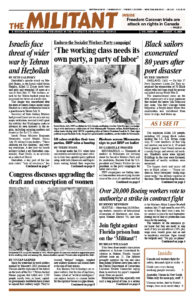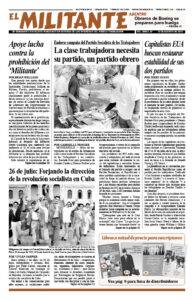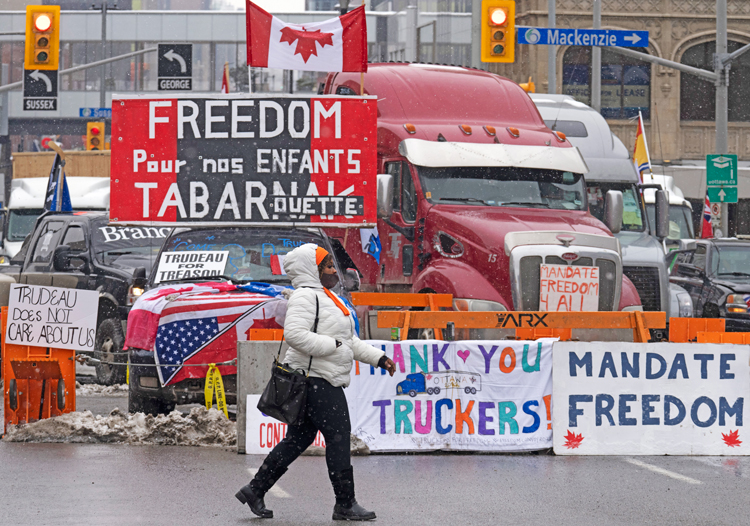MONTREAL — Despite a strong ruling by Federal Court Justice Richard Mosley earlier this year saying Prime Minister Justin Trudeau’s government invoking the draconian Emergencies Act to crush a truckers’ protest in 2022 was unconstitutional and illegal, the trials of leaders and participants in that Freedom Convoy on criminal charges are continuing.
At the center of these trials is defense of free speech and assembly to protest government policies — political rights won in struggle that working people need to organize, demonstrate and build unions. This is crucial to defend ourselves against efforts by Canada’s capitalist rulers to make working people pay for the deepening economic and social crisis caused by their profit system.
Using the Emergencies Act for the first time, Trudeau’s government mobilized 3,000 heavily armed cops to clear out a three-week-long encampment of thousands of truckers and supporters. They had peacefully camped in downtown Ottawa with their rigs to demand that Trudeau end government-enforced COVID-19 vaccine mandates that threatened their jobs. The protest was supported by several U.S.-Canada border truck blockades in solidarity.
The Freedom Convoy protest “did not constitute threats or use of serious violence to persons or property,” Mosley ruled.
Trudeau’s use of the act “would open the door for any sufficiently disruptive event — say a legal strike at a port — to be deemed a threat to national security,” the editors of the Globe and Mail said Jan. 24.
Ottawa is appealing Mosley’s ruling.
Over 200 protesters were arrested and charged with various criminal offenses, the most common being “mischief over $5,000,” for which the maximum penalty is 10 years in prison.
Frame-up trials
Tamara Lich and Chris Barber, two spokespeople for the convoy, are being tried as “co-conspirators” before Justice Heather Perkins-McVey in Ottawa.
The state’s case is based not on what Lich or Barber did, but statements they made. Their free-speech fight is being supported by two civil liberties groups: The Democracy Fund and the Justice Center for Constitutional Freedoms. Defense lawyers say conduct by Lich and Barber is protected by the Canadian Charter of Rights and Freedoms.
The trial, which began last September, was supposed to last 16 days, but has been prolonged by procedural delays. Final arguments are now scheduled for Aug. 13-15, after which the judge has six months to render a verdict.
“The trial is a major attack on free speech and the right to protest,” the Communist League in Canada said in a statement released at the beginning of the trial. “The unions and all defenders of democratic rights should demand an immediate end to the trial and the withdrawal of all charges against them and other participants in the protest.”
The trial of trucker Pat King began in May. He faces nine charges, including mischief, intimidation, obstructing police and disobeying a court order. Using videos of remarks made by King, prosecutors are trying to prove he was a leader of the Ottawa protest and used his control and influence to break the law. The state is demanding a four-year jail term.
Final arguments in King’s case were presented July 26. The prosecutors claimed his statements encouraged the protest and show he crossed the line from expression of views into criminal activity. Defense lawyers said he was peacefully exercising his right to protest. A verdict is expected Oct. 4.
In another frame-up case, Alberta truckers Alex Van Herk, Marco Van Huigenbos and Gerhard Janzen were each found guilty of mischief over $5,000 for blocking the border crossing in Coutts, Alberta, for two weeks. They await sentencing. The courtroom was packed with supporters.
Federal prosecutor Steve Johnson claimed these truckers were key players in the protest and spoke on behalf of the protesters. “They used the words ‘we, our and us,’” he said.
Van Herk told the press he is proud of participating in the protest. “If that’s what it takes, that we can show politicians what is right, and we’ll do whatever sentence that is, I’d do it again tomorrow,” he said.
Over the coming months more trials and appeals will take place for Freedom Convoy protesters. Working people need to stand up against these attacks on the rights of the working class.


